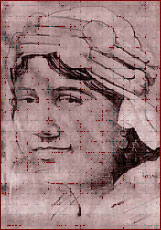(1886 – 1918)
Poet, write and feminist, Malak Hifni Nasif, later known by her pen name, Bahithat al-Badiya, “Seeker in the Desert” was born in Cairo in 1886. Her father, Hifni Nasif, was a well educated man, and he believed in women’s education. In 1903, Malak Hifni Nasef graduated from al-Saniya School, the first teacher training school in Cairo. She taught for a while at the school.
She was invited to be a lecturer in the women’s section at Egyptian University and at al-Garida newspaper.
She tackled a variety of social and cultural issues in her regular column for al-Garida. She defended Egyptian women and criticized the conservatives who belittled women’s abilities. Her efforts were focused on promoting women’s education. When asked how she felt about women wearing the veil, she replied: educate women, and then let them make their own choice.
In 1910, a collection of Malak Hifni Nasif’s speeches and essays were published under the title “al-Nisa’iyat,” Feminist Pieces. A year later, she wrote to the Egyptian Parliament with a list of ten demands for the improvement of women’s position in society.
Malak Hifni Nasif’s life took an abrupt turn when she married Abd al-Sattar al-Basil, the chief of a Bedouin tribe, and gave up teaching to live with him in the Fayoum oasis west of Cairo. She was shocked and saddened to find that he was already married to his cousin and that they had a daughter whom she was expected to tutor. Malak became a strong advocate of women’s’ rights within marriage and spoke out against polygamy. She stressed that Islam condoned the practice only in very specific circumstances.
She died of influenza in 1918, at the young age of 32.
In 1962, her brother collected and published her writings as “Athar Bahithat al-Badiya, Malak Nasif “(The Heritage of Bahithat al-Badiya).


